
Corinna is a town in Penobscot County, Maine, United States. The population was 2,221 at the 2020 census. It is part of the Bangor metropolitan statistical area. The village of Corinna is in the southern part of the town.

Acton is a town in Middlesex County, Massachusetts, United States, approximately 21 miles (34 km) west-northwest of Boston along Massachusetts Route 2 west of Concord and about ten miles (16 km) southwest of Lowell. The population was 24,021 in April 2020, according to the United States Census Bureau. It is bordered by Westford and Littleton to the north, Concord and Carlisle to the east, Stow, Maynard, and Sudbury to the south and Boxborough to the west. Acton became an incorporated town in 1735. The town employs the Open Town Meeting form of government with a town manager and an elected, five-member select board. Acton was named the 11th Best Place To Live among small towns in the country by Money Magazine in 2015, and the 16th best in 2009 and in 2011. The local high school, Acton-Boxborough Regional High School, was named a Blue Ribbon School by the U.S. Department of Education in 2009.

Stow is a town in Middlesex County, Massachusetts, United States. The town is located 21 miles (34 km) west of Boston, in the MetroWest region of Massachusetts. The population was 7,174 at the 2020 census. Stow was officially incorporated in 1683 with an area of approximately 40 square miles (100 km2).

Bellows Falls is an incorporated village located in the town of Rockingham in Windham County, Vermont, United States. The population was 2,747 at the 2020 census. Bellows Falls is home to the Green Mountain Railroad, a heritage railroad; the annual Roots on the River Festival; and the No Film Film Festival.

Maynard is a town in Middlesex County, Massachusetts, United States. The town is located 22 miles west of Boston, in the MetroWest and Greater Boston region of Massachusetts and borders Acton, Concord, Stow and Sudbury. The town's population was 10,746 as of the 2020 United States Census.

Ludlow is an incorporated village within the town of Ludlow, Windsor County, Vermont, United States. It is sometimes called Ludlow Village, to distinguish it from the surrounding town of the same name. The population was 773 at the 2020 census.
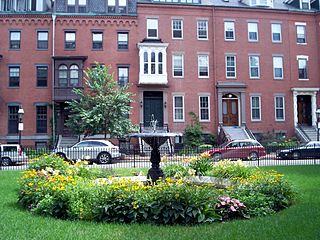
The South End is a neighborhood of Boston, Massachusetts. It is bordered by Back Bay, Chinatown, and Roxbury. It is distinguished from other neighborhoods by its Victorian-style houses and the many parks in and around the area. The South End is the largest intact Victorian row house district in the country, as it is made up of over 300 acres. Eleven residential parks are contained within the South End. In 1973, the South End was listed in the National Register of Historic Places. Much of the South End was originally marshlands in Boston's South Bay. After being filled in, construction of the neighborhood began in 1849.

Dorchester is a Boston neighborhood comprising more than 6 square miles (16 km2) in the City of Boston, Massachusetts, United States. Originally, Dorchester was a separate town, founded by Puritans who emigrated in 1630 from Dorchester, Dorset, England, to the Massachusetts Bay Colony. This dissolved municipality, Boston's largest neighborhood by far, is often divided by city planners in order to create two planning areas roughly equivalent in size and population to other Boston neighborhoods.

Beacon Hill is a historic neighborhood in Boston, Massachusetts, and the hill upon which the Massachusetts State House resides. The term "Beacon Hill" is used locally as a metonym to refer to the state government or the legislature itself, much like Washington, D.C.'s Capitol Hill does at the federal level.

The Assabet River is a small, 34.4-mile (55.4 km) long river located about 20 miles (30 km) west of Boston, Massachusetts, United States. The Assabet rises from a swampy area known as the Assabet Reservoir in Westborough, Massachusetts, and flows northeast before merging with the Sudbury River at Egg Rock in Concord, Massachusetts, to become the Concord River. The Organization for the Assabet, Sudbury and Concord Rivers, headquartered in West Concord, Massachusetts, is a non-profit organization dedicated to the preservation, protection, and enhancement of the natural and recreational features of these three rivers and their watershed. As the Concord River is a tributary of the Merrimack River, it and the Assabet and Sudbury rivers are part of the larger Merrimack River watershed.
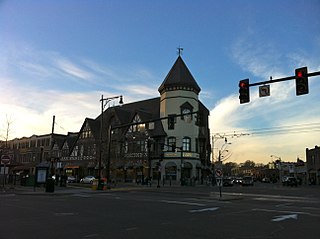

Bay Village is the smallest officially recognized neighborhood of Boston, Massachusetts. As of 2010, its population was approximately 1,312 residents living in 837 housing units, most of which are small brick rowhouses.
The American Woolen Company is a designer, manufacturer and distributor of men’s and women’s worsted and woolen fabrics. Based in Stafford Springs, Connecticut, the company operates from the 160-year-old Warren Mills, which it acquired from Loro Piana SpA in June 2014.

Glenwood Cemetery is a historic rural cemetery northeast of Parker Street and Great Road in Maynard, Massachusetts. It is one of the first municipal creations of the town after its incorporation in 1871, and is the resting place of many of its early and prominent residents, including Amory Maynard, founder of the Assabet Woolen Mill and namesake of the community. The cemetery was added to the National Register of Historic Places (NR#04000425) on May 12, 2004.
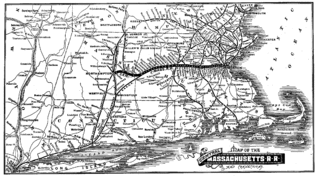
Gleasondale is a village straddling the border between the towns of Hudson and Stow in Middlesex County, Massachusetts, United States. It is located along the Assabet River. For many decades it was home to various mills, though it is now primarily residential. According to the Geographic Names Information System (GNIS), Gleasondale is a "populated place" named after Benjamin W. Gleason and Samuel J. Dale.
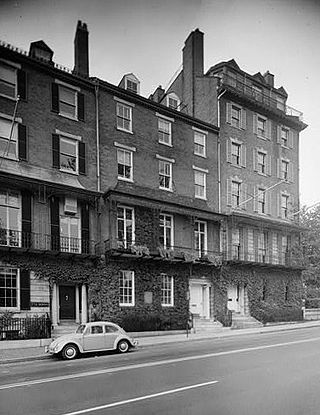
Cornelius Coolidge was a real estate developer in early 19th-century Boston, Massachusetts, who constructed buildings in Boston's Beacon Hill neighborhood, and elsewhere. As a young man he had been involved in maritime trade, and not always within the prescribed laws. During the War of 1812, the brig Dispatch owned by Coolidge and Francis Oliver was captured outside Boston Harbor by the Salem privateer Castigator on suspicion of having been trading with the enemy. Coolidge and Oliver manned two boats with 45 armed men, rowed down the harbor, and regained their brig after an exchange of gunfire. However, the brig was restored to the privateers by the district court.
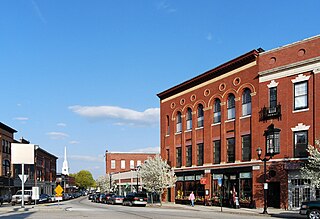
Hudson is a town in Middlesex County, Massachusetts, United States, with a total population of 20,092 as of the 2020 census. Before its incorporation as a town in 1866, Hudson was a neighborhood and unincorporated village of Marlborough, Massachusetts, and was known as Feltonville. From around 1850 until the last shoe factory burned down in 1968, Hudson was a mill town specializing in the production of shoes and related products. At one point the town had 17 shoe factories, many of them powered by the Assabet River, which runs through town. The many factories in Hudson attracted immigrants from Canada and Europe. Today most residents are of either Portuguese or Irish descent, with a smaller percentage being of French, Italian, English, or Scotch-Irish descent. While some manufacturing remains in Hudson, the town is now primarily residential. Hudson is served by the Hudson Public Schools district.

The Assabet Woolen Mill was originally a textile factory complex founded by Amory Maynard in 1847 near the Assabet River in the northern part of what was then Sudbury, Massachusetts. The area became the Town of Maynard in 1871. The business went bankrupt in 1898, but reopened in 1899 as part of the American Woolen Company, which expanded it. The mill ceased operation as a woolen mill in 1950. The buildings were later repurposed by Digital Equipment Corporation (DEC) as its corporate headquarters. As of 2015, the facility is host to various small business as "Mill & Main". See Maynard, Massachusetts for further details regarding the use of the dozen or so mill buildings.
Pranker Mills, also known as the Iroquois Mills, is a former American textile mill located in Saugus, Massachusetts that was in operation from 1822 to 1915.

Amory Maynard (1804–1890) was a textile manufacturer who was the namesake of Maynard, Massachusetts.




















